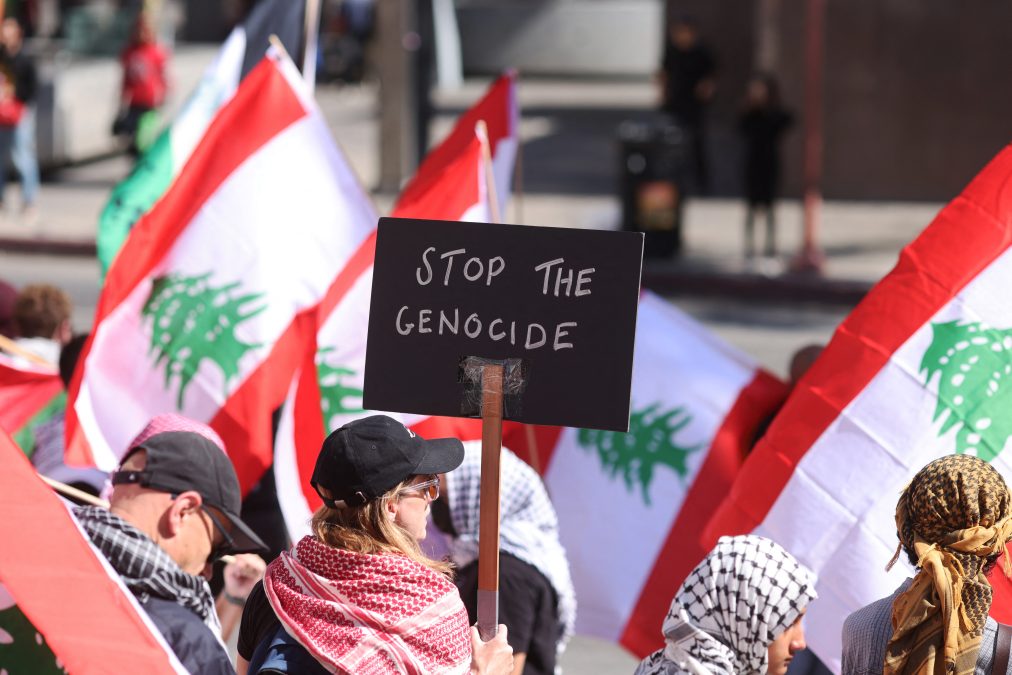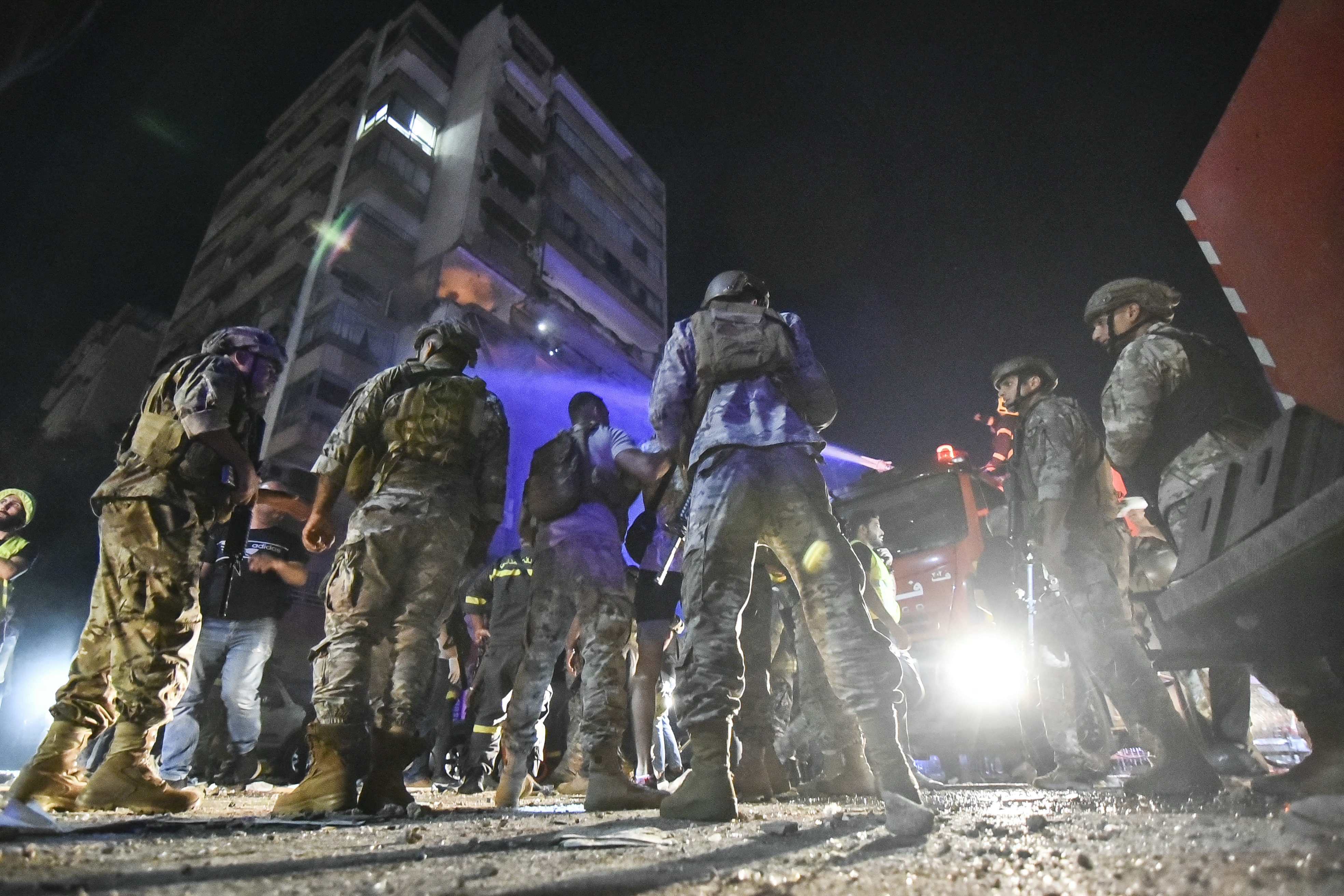Beirut — Lebanon’s health ministry said Israeli strikes killed more than 100 people on Sunday after Israel’s military said it had kept up its bombardment of Hezbollah targets there and also struck Yemen.
The health ministry in a revised toll issued late Sunday put the total killed at 105 and 359 wounded.
In early Monday Israeli air strikes, four people were killed in central Beirut on Monday, a Lebanese security source said, the first strike on the city since 2006. An Israeli drone targeted an apartment belonging to two members of the Lebanese Sunni group Jamaa Islamiya, said the source.
“At least four people were killed in an Israeli drone strike targeting a flat belonging to Jamaa Islamiya in Beirut’s inner city,” according to the source.
The Israeli military said in a statement it carried out strikes on dozens of Hezbollah targets in Lebanon. The Israeli fighter jets launched fresh strikes on dozens of the alleged Hezbollah targets in Lebanon’s Bekaa region on Monday morning.
Israeli Air Force jets “attacked dozens of launchers and buildings where weapons were stored in the Bekaa in Lebanon,” it said in a statement on Telegram.
Meanwhile, Saudi Arabia expressed its “great concern” at the conflict in Lebanon on Monday, calling for the country’s “sovereignty and territorial integrity” to be respected.
“The Kingdom calls on the international community to assume its responsibilities towards protecting regional peace and security to spare the region and its people the dangers and tragedies of wars,” a foreign ministry statement said.
The central Beirut strike marks the first time Israel has carried out attacks within Beirut’s city walls in a long time.
Television footage showed the partially flattened floor of the building targeted by the strike, in the predominantly Sunni neighborhood of Kola, near the road linking the capital to Beirut airport.
AFP journalists reported drones flying over the Lebanese capital throughout Sunday.
The Israeli army has also shelled the southern suburbs of Beirut on several occasions in recent days.
Jamaa Islamiya has been the target of several Israeli strikes since the escalation began on the Israeli-Lebanese border.
The attacks on Sunday come after an air strike on Beirut’s densely populated southern suburbs on Friday killed Hassan Nasrallah, the head of Lebanon’s Hezbollah group which has engaged in cross-border fire with Israel for almost a year.
Hezbollah says it is acting in support of Hamas militants in Gaza.
After Israel turned its focus north from Gaza to Lebanon and cross-border fire escalated, Israeli attacks have killed hundreds since last Monday, the deadliest day since Lebanon’s 1975-1990 civil war.
Lebanon’s health ministry said there had been deadly air raids near the main southern city of Sidon Sunday, while dozens more had died in the east, in the south, and in and around Beirut.
France’s foreign ministry said Sunday a second French national had been killed in Lebanon after a woman died following a south Lebanon blast on Monday.
The announcement came as French Foreign Minister Jean-Noel Barrot arrived in Lebanon, the first high-level foreign diplomat to visit since the Israeli air strikes intensified.
Barrot spoke earlier with Prime Minister Najib Mikati and said Paris sought “an immediate halt” to Israeli strikes.

France also appealed for Hezbollah and its backer Iran to abstain from any action that could lead to “regional conflagration”.
Pope Francis, asked about Israeli air strikes on civilians, said a country “goes beyond morality” when defense is not proportional to the attack.
Israeli military operations in Lebanon seek to downgrade Hezbollah’s capacity to attack Israel, eliminate the group’s military leadership, and “clean” the border areas from fighters, an Israeli security official said Friday.
Israel’s military said dozens of its warplanes had attacked targets of Huthi rebels in war-ravaged Yemen Sunday, including around Hodeida port, a key entry point for fuel and humanitarian aid.
Huthi media reports said the strikes had killed four people and wounded 33.
The Yemen raids came a day after the Huthis said they targeted Israel’s Ben Gurion Airport with a missile, trying to hit it as Prime Minister Benjamin Netanyahu returned from New York.
Separately, Israel’s military said the air strike that killed Nasrallah had “eliminated” another 20 Hezbollah members, after earlier strikes killed Nasrallah’s right-hand man Fuad Shukr, and the head of the elite Radwan Force, Ibrahim Aqil.
Israel also said Nabil Qaouq, a member of Hezbollah’s central council, was killed in a strike on Saturday.
Hezbollah has yet to officially announce his death, but a source close to the group said Qaouq had been killed.
Israeli bombardment has killed more than 700 people in a week, including 14 paramedics over a two-day period, according to Lebanon’s health ministry.
Israel’s military said late Sunday it had hit 120 Hezbollah targets.
Hezbollah said it had again fired rockets at the northern Israeli town of Safed.
Hezbollah is a powerful political, military, and social force in Lebanon, but the killing of Nasrallah — its figurehead who enjoyed cult status among supporters — has dealt it a seismic blow.
Netanyahu said Israel had “settled the score” with his killing.
But in the northern Israeli town of Rosh Pina, Matan Sofer had mixed feelings. Sofer, 24, welcomed the “good news” of Nasrallah’s death but wondered if “we risk it getting worse”.
US President Joe Biden — whose government is Israel’s top arms supplier — said Sunday a wider war “really has to be avoided”.
Analysts told AFP Nasrallah’s death leaves a bruised Hezbollah under pressure to respond.
For Tehran, his killing “has not altered the fact that Iran still does not want to get directly engaged” in the ongoing conflict, said Ali Vaez of the International Crisis Group.
Iran said a member of its Revolutionary Guards was also killed alongside Nasrallah.
UN refugee chief Filippo Grandi said “well over 200,000 people are displaced inside Lebanon” and more than 50,000 have fled to neighboring Syria.
Prime Minister Mikati said up to one million people may have been uprooted, in potentially the “largest displacement movement” in Lebanon’s history.
In Gaza, the territory’s civil defense agency said Israeli strikes Sunday killed several people.
Hamas’s unprecedented October 7 attack on Israel resulted in the deaths of 1,205 people, mostly civilians, according to an AFP tally based on Israeli official figures that include hostages killed in captivity. According to Israeli media Haaretz, most of the Israeli civilians died from Israeli security fire trying to control the Hamas attack on October 7.
Of the 251 hostages seized by militants, 97 are still held in Gaza, including 33 the Israeli military says are dead. Israel’s retaliatory military offensive has killed at least 41,595 people in Gaza, most of them civilians, according to figures provided by the Hamas-run territory’s health ministry. The UN has described the figures as reliable.








